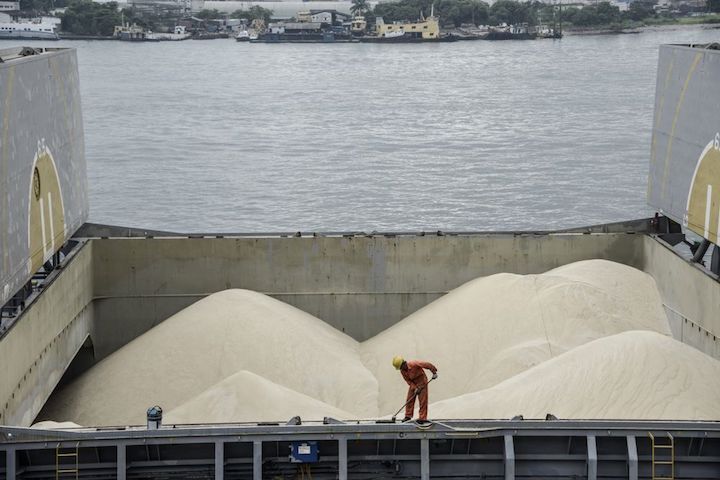Sugar ships queuing in Brazil signal bounce in commodity demand
In Brazil, the world’s top sugar producer, the queue for ships to export the commodity is lengthening in a bullish sign that the biggest supplies ever linked to the expiration of a futures contract are bound for consumers around the world.
Through Monday, the queue of vessels loading or expected to take the raw material at Santos, Brazil’s biggest port, increased 50% since the expiration of the May raw-sugar contract on ICE Futures U.S. on April 30, according to data from shipping agency Williams. The number of ships climbed to 35 for handling 1.6 million metric tons of sugar to countries including Iraq, Bangladesh, Yemen, Morocco, China and Nigeria.

The premium of refined sugar over the unprocessed raw commodity rose to the highest since 2013, often a bullish signal. Last week, the outlook was murky after Singapore-based Wilmar International Ltd. and China’s Cofco International Ltd., which usually supply consuming markets, combined to deliver a record 2.26 million tons from Brazil against the ICE contract. Most-active futures have dropped 20% this year as the coronavirus pandemic upended the global economy.
When the buyer nominates a vessel quickly, it typically “shows there is demand at the final destination, or at least he wants it to look like there is,” and prices tend to respond, Arnaldo Correa, a partner at Archer Consulting in Sao Paulo, said in a report.
The refined premium is boosting demand for raw sugar, said Michael McDougall, manging director at Paragon Global Markets in New York. The drop in production in Thailand and India’s muted prospects for exports mean South America is driving supplies, he said.
“This will make Brazil’s ability to perform very important” as mills face financial woes from the recent price slump and crash in cane-based biofuel demand, he said. The real’s slump against the dollar makes exports int he greenback more appealing, he said.
Consumption in the Middle East typically gains during Ramadan, which runs for 30 days and ends on May 23.
A surge in soybean exports from Brazil may jam crop shipments, said Bruno Lima, risk manager for INTL FCStone in Sao Paulo.
Similar Stories

James Fisher to enhance its fleet of the future with four new state-of-the-art tanker vessels
View ArticlePort of New Orleans announces $1 million EPA grant to support LIT sustainable infrastructure and workforce development
The Port of New Orleans (Port NOLA) announced today it was awarded $1,000,000 from the Environmental Protection Agency (EPA) for its Louisiana International Terminal (LIT) Sustainability Management Plan (SMP).
View ArticleEmpowering the DOC holder: data-driven decisions should define FuelEU compliance strategy, says OceanScore
Ship managers must navigate tricky commercial terrain to mitigate their financial exposure as DOC holder with responsibility for compliance under FuelEU Maritime.
View Article
deugro USA expands by opening a second warehouse facility
View ArticleLloyd’s List Intelligence acquires counterparty risk provider Infospectrum
Will combine complementary capabilities to provide complete risk management intelligence.
View Article
Marguisa adds new vessel and reinforces its MFS service
View ArticleGet the most up-to-date trending news!
SubscribeIndustry updates and weekly newsletter direct to your inbox!





